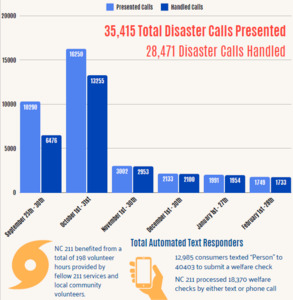Introduction
United Way of North Carolina (UWNC) and its information referral service, NC 211, played a pivotal role in Hurricane Helene’s disaster relief and recovery efforts. Their involvement began on Wednesday, September 25, 2024, when former Governor Roy Cooper declared a State of Emergency and activated NC 211’s resource hotline.1 From that moment, UWNC was stationed at the Emergency Operations Center (EOC) in Raleigh, North Carolina for 26 consecutive days, gathering and disseminating crucial information about shelters, weather conditions, and available resources through real-time social media updates, website notifications, and NC 211’s comprehensive resource database.
Implementing a Welfare Check System
As soon as the State of Emergency was declared, NC 211 was inundated with thousands of calls from individuals desperate to locate their loved ones. In response, Brittany Pruitt Fletcher, President and CEO of UWNC, swiftly implemented a text-based welfare check system. By texting “PERSON” to 40403, individuals received a form to complete, streamlining the overwhelming influx of requests. Over the following 5 months, nearly 16,000 welfare checks were processed via call and text (Figure 1). Typically, NC 211 handles about 15,000 NC 211 calls per month, but during the peak of Hurricane Helene relief efforts, call volume surged to over 30,000 NC 211 calls in October alone. Among those 30,000+ calls, many callers were turning to NC 211 for resource information on Hurricane news, shelter, food access, clothing, health care needs, and more.
UWNC Financial Initiatives
By Saturday, September 29th, UWNC had launched the UW Helps NC Fund, designed to distribute financial support to local United Ways and agencies responding to urgent disaster relief and recovery needs.2 Additionally, UWNC managed the Governor’s North Carolina Disaster Relief Fund (NCDRF) during the crisis, administering $10,000 grants to eligible 501(c)(3) nonprofits.3 By November 14th, donations surpassed $14 million, enabling UWNC staff to diligently review and process applications.4 By January 2025, when the NCDRF transitioned to the North Carolina Community Foundation (NCCF), UWNC had approved funding for over 150 nonprofits engaged in rebuilding efforts, which can be found in detail based on each nonprofit on United Way of North Carolina’s website.5
Alongside these financial initiatives, UWNC collaborated with Prezzee and GoFundMe.org to provide immediate assistance to impacted North Carolinians. The GoFundMe.org campaign raised $100,000, which was used to distribute $200 cash-equivalent grants to families grappling with the storm’s devastation.6 Furthermore, a partnership with Airbnb provided 540 credits of free housing to families who had lost their homes.
Support poured in from various organizations and celebrities eager to assist. The cast of the hit TV show Scandal hosted a virtual script reading that raised nearly $60,000, while the North Carolina Courage soccer team organized a home game fundraiser, generating $18,000 for the UW Helps NC Fund.7 Donation drives were also coordinated daily with local United Ways, securing vital resources such as 2000 bottles of allergy nasal spray and $80,000 worth of clothing.
Staff Support
UWNC was also bolstered by volunteers and fellow 211 organizations nationwide who stepped up to assist with the influx of calls. David Mercado, Senior Director of Operations at UWNC, led volunteer training sessions while personally managing the NC 211 call center and answering calls himself when staff capacity was exceeded.
Even while managing fundraisers, partnerships, donation drives, and call center operations, Brittany Pruitt Fletcher, President and CEO, and David Mercado, Senior Director of Operations, maintained biweekly check-ins with affected local United Ways. Their dedication extended beyond immediate relief; on November 8th and 9th, they welcomed Angela F. Williams, President and CEO of United Way Worldwide, to North Carolina to tour the most devastated areas and meet with local leaders.8 Her visit reaffirmed United Way’s commitment to supporting long-term disaster recovery efforts, like working diligently to address the needs of the local United Ways in Western North Carolina.
However, the need for disaster preparedness is great, and ensuring our other partners across the state have the tools and resources to respond to future disasters is also a priority. We have pulled together disaster preparedness checklists, are planning annual workshops, and brokering relationships between the local United Ways and their EOCs, as we never know when the next disaster will strike. We plan to continue building out best practices and lessons learned from Hurricane Helene and apply this knowledge when we experience another disaster. UWNC also opened the UW Helps NC Fund on April 1, 2025, to allow any donated funds from that date forward to support any disaster relief efforts, whenever they are needed.
Conclusion
In the months following Hurricane Helene, Brittany Pruitt Fletcher, David Mercado, and local United Way leaders remained engaged with disaster recovery centers and emergency operation hubs across the state. Their ongoing efforts aim to establish proactive strategies and refined response plans to ensure North Carolina is better prepared for future crises; ongoing efforts include disaster preparedness checklists, holding annual workshops, and brokering relationships between the local United Ways and their Emergency Operations Centers.
Acknowledgments
We extend our deepest gratitude to the North Carolina Emergency Operations Center for their tireless leadership and coordination during Hurricane Helene response efforts. Our sincere thanks also go to the local United Ways across the state whose dedication and on-the-ground support made a lasting impact in the relief and recovery process. We are incredibly thankful to every individual, family, and organization who generously contributed to the relief and recovery efforts on the ground, as well as to the funds given to the UW Helps NC Fund and the NC Disaster Relief Fund—your compassion and support provided critical resources and hope to communities in need. Your collective efforts exemplify the strength and resilience of North Carolina. Last but not least, thank you to the NC 211 staff members and 211 volunteers who worked tirelessly to support our community members in need of Helene related resources and information.
Disclosure of interests
The author has no conflicts of interest or financial support to declare.


